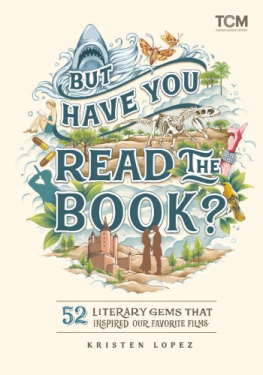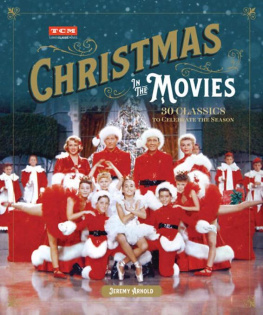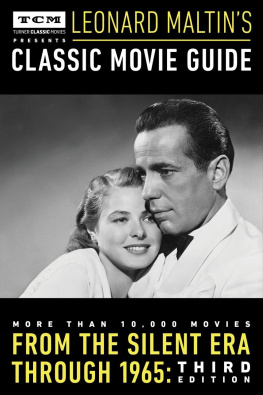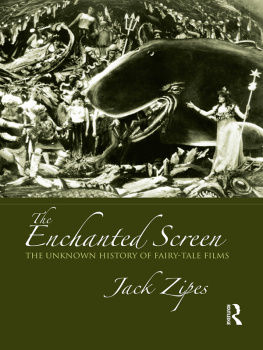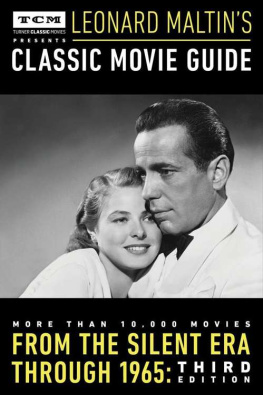Copyright 2023 by Turner Classic Movies, Inc.
Interior and cover illustrations copyright 2023 by Jyotirmayee Patra
Cover copyright 2023 by Hachette Book Group, Inc.
Hachette Book Group supports the right to free expression and the value of copyright. The purpose of copyright is to encourage writers and artists to produce the creative works that enrich our culture.
The scanning, uploading, and distribution of this book without permission is a theft of the authors intellectual property. If you would like permission to use material from the book (other than for review purposes), please contact permissions@hbgusa.com. Thank you for your support of the authors rights.
Running Press
Hachette Book Group
1290 Avenue of the Americas, New York, NY 10104
www.runningpress.com
@Running_Press
First edition: March 2023
Published by Running Press, an imprint of Perseus Books, LLC, a subsidiary of Hachette Book Group, Inc. The Running Press name and logo are trademarks of the Hachette Book Group.
The Hachette Speakers Bureau provides a wide range of authors for speaking events. To find out more, go to www.hachettespeakersbureau.com or call (866) 376-6591.
The publisher is not responsible for websites (or their content) that are not owned by the publisher.
Library of Congress Cataloging-in-Publication Data has been applied for.
LCCN: 2022016529
ISBNs: 978-0-7624-8097-5 (hardcover), 978-0-7624-8098-2 (ebook)
E3-20230117-JV-NF-ORI
Contents
To my mom, grandpa, and Uncle Sean. Thank you for giving me enough stories to turn me into a proper author.
I love that movie!
But have you read the book?
I was always the one who read the book before seeing a movie. If a new film I was excited to see was an adaptation, I would find a copy of the book and read it right away. I hated waiting, so at least the book would give me a way of seeing it ahead of time. But, also, reading the book gave me an opportunity to have the inside track. I was part of the select group who had read the book that a hot new movie was based on and, thus, I knew not only what happened but the stuff that never made it to the screen at all. The fifty-two books youll read about here didnt just inspire some of the biggest, most enduring films in the world. They also represent some of the best works of literature. They are a starter course, not just for good movies to enjoy, but for great books to get lost in.
Studios have adapted novels since the foundation of film itself. A studio buying a popular book often was presumed to bring in a built-in fanbase and showed that the industry knew what was popular. For the most part, adaptations are not direct translations of their source material, as there are different narrative beats needed for film versus novel. In 1924, director Erich von Stroheim attempted to craft a literal translation of the Frank Norris novel McTeague . The feature Greed, clocking in at nine and a half hours, was abhorred by MGM executives, who insisted on numerous cuts. The filmonce thought to be von Stroheims magnum opuswas criticized for being largely incoherent.
In selecting the books for this compendium, I wanted a broad cross-section, not just of genres and authors, but translations that are either literal or completely different. The Coen brothers adaptation of No Country for Old Men is practically a copy of Cormac McCarthys book, whereas Patricia Highsmiths The Talented Mr. Ripley shares little more than the basic framework of the 1999 feature directed by Anthony Minghella. Steven Spielbergs Jurassic Park is considered one of the most popular and thrilling films ever made, yet Michael Crichtons novel includes several equally exciting set pieces that were not used in the film, as well as a larger ensemble cast whose lives are cut down in shocking ways. Some movies eschew their source material entirely in favor of telling a wholly original tale. Case in point, much of Mary Shelleys Frankenstein , one of the seminal works of horror literature, was practically ignored in director James Whales 1931 adaptation, in favor of focusing on Dr. Frankensteins creature (played by Boris Karloff in a truly iconic performance) and the destruction he wreaks.
Of course, there were several book and film pairs that didnt make the cut. The world of crime has been rife with adaptation, most famously through the works of Raymond Chandler and Dashiell Hammett, but authors Dennis Lehane and James Ellroy have also crafted beautiful crime novels that yielded equally engaging films, such as Mystic River and L.A. Confidential , respectively. Anne Rices instantly unforgettable horror novel Interview with the Vampire had Tom Cruise and Brad Pitt bring her characters to life in a movie that divides audiences and critics to this day. And lets not forget the biographies that have been adapted to films, like Jordan Belforts The Wolf of Wall Street . An entry for But Have You Read the Book? Volume 2, perhaps?
My hope is this book will not just give you fifty-two movies to watcheither for the first time or the one hundredthbut also provide you a mountain of equally entertaining books to read. Enjoy your reading!
KRISTEN LOPEZ
Spoilers Ahead M any of these books and movies are well-known, and the entries will discuss details in-depth, including the fates of characters and endings. Youve been warned.
DIRECTED BY James Whale
SCREENPLAY BY Garrett Fort & Francis Edward Faragoh
BASED ON Frankenstein; or, The Modern Prometheus by Mary Shelley, 1818
In the name of God! Now I know what it feels like to be God!
F rom Boris Karloffs dead-eyed, flat-topped depiction of the monster to Colin Clive shouting Its alive! Its alive! as thunder cracks and lightning flashes, director James Whales adaptation of Mary Shelleys Frankenstein is synonymous with the horror genre, as well as the entire brand of monsters associated with Universal Studios. Frankenstein tells the story of a scientist and the creature he brings to life using body parts of the dead. The film came hot on the heels of another adaptation of a classic horror novel: Bram Stokers Dracula. The runaway success of that Bela Lugosistarring monster movie inspired Universal head Carl Laemmle Jr. to greenlight more horror films. In fact, Lugosi had hoped to play Dr. Henry Frankenstein (changed from Victor Frankenstein in the novel, in keeping with the 1927 London stage version) but was offered the role of the creature, which he later lost due to unsatisfactory makeup tests and the studios removal of the original director, Robert Florey.
Florey had envisioned a Frankenstein feature where the creature was little more than a mindless killing machine, but Whale saw the character as having more humanity within. Interestingly, while Whales version is more in line with Shelleys original character, the 1931 feature film is nearly a complete revision of the text. Originally published in 1818 when Shelley was just twenty, Frankenstein is a prime example of Romantic-era literature, with its emphasis on reveling in the splendor of the natural world. Its also a tale of loneliness, isolation, and the horror of playing God. While Whales monster is a childlike character who doesnt understand that a young girl wont float on water as easily as a flower, Shelleys is an educated, eloquent creature in anguish about the nature of his existence.
The origins of the novel go back to an evening that Shelley and her husband, Percy Bysshe Shelley, visited Lord Byron and the group decided to see who could conjure up the scariest story. Shelleys thrilling tale was one of knowledge and science. Ironically, she depicted many of the women in Frankenstein as passive, being either mothers or lovers. This choice could be a commentary on science being a male-dominated field at the time and illustrates the roles in which women remained mired. Dr. Victor Frankenstein ends the novel alone and tormented by what his Creature has done.
Next page
